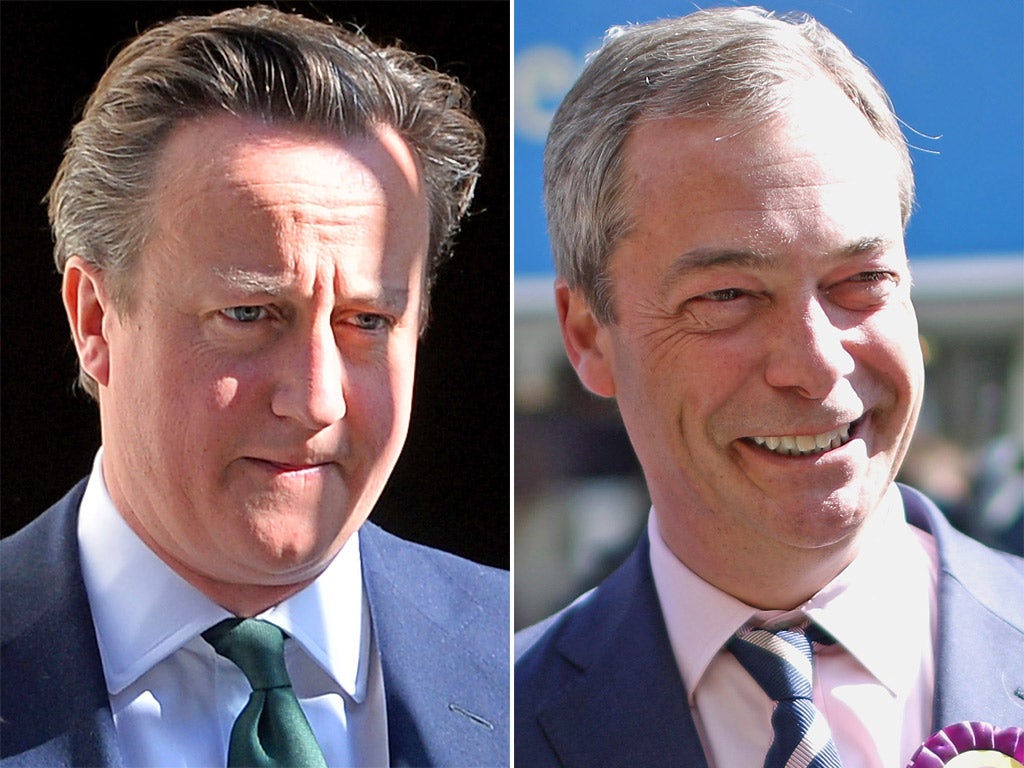Blow for David Cameron as popularity falls to lowest level since general election as polls show Ukip are favourable to Liberal Democrats for first time
Dismal performance in local elections could reignite internal dissent over David Cameron's leadership

Prime Minister David Cameron suffered a blow ahead of Thursday’s local elections as new figures showed his popularity had fallen to its lowest level since the last general election.
The Prime Minister now lags behind Ed Miliband, the Labour leader, in public esteem in a monthly survey of voters’ attitudes to the main political leaders.
As the Conservatives brace themselves for heavy losses in local elections taking place across much of England, a dismal performance could reignite internal dissent over Mr Cameron’s leadership.
The Prime Minister’s sliding popularity was revealed by the monthly National Policy Monitor study carried out by YouGov for the University of Essex.
Asked to rate political leaders on a scale of one to ten, voters awarded the Prime Minister an average ranking of 3.5, compared with 5.1 in May 2010.
While Mr Miliband hardly receives an enthusiastic endorsement from the public, his rating of 3.75 puts him comfortably ahead of the Tory leader.
Nick Clegg receives the lowest score of the party leaders with just 3.05.
Paul Whiteley, the monitor’s director, said: “The popularity of the party leaders plays a key role in influencing how people vote in elections in Britain. The leader in front will do best, even though he may not be that popular.”
The finding is a setback to Conservative strategists as they believe they can successfully contrast Mr Cameron’s leadership abilities with Mr Miliband’s.
The latest poll of polls for The Independent shows the Tories narrowed Labour’s lead during April and for the first time puts the UK Independence Party (Ukip) ahead of the Liberal Democrats.
It puts Labour on 39 per cent (down one point since March), the Conservatives on 31 per cent (up two), Ukip on 12 per cent (unchanged) and the Liberal Democrats on 11 per cent (down one).
The Tory mini-revival follows George Osborne’s well-received Budget and the death and funeral of Baroness Thatcher.
The poll of polls is compiled by John Curtice, professor of politics at Strathclyde University. It shows that Ukip’s support has quadrupled since January 2012 and is consolidating.
Repeated in a general election, those figures could send Mr Miliband to Downing Street with a parliamentary majority of more than 80.
More immediately, they underline that the Conservatives are certain to suffer a wave of council losses on Thursday.
The seats being contested were last fought in 2009 when Gordon Brown’s government was at the depth of its fortunes.
Election experts predict the Tories will lose around 310 of the 1,485 seats they are defending; losses on a larger scale will dismay Conservative headquarters.
Labour are forecast to make about 350 gains and will need to point to victories in counties such as Essex and Kent to prove Mr Miliband is reaching out to voters in the South-East.
Ukip are tipped to win about 40 seats, although if they manage to pick up around 12 per cent of the vote their presence could deprive the Tories of holding on in many more council wards.
On current form, the Liberal Democrats would lose about 130 seats but are aiming to limit their losses to less than 100.
Join our commenting forum
Join thought-provoking conversations, follow other Independent readers and see their replies
Comments